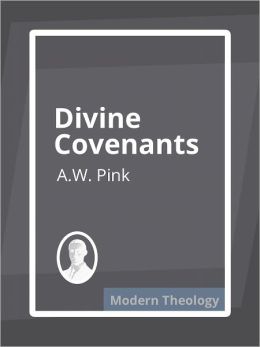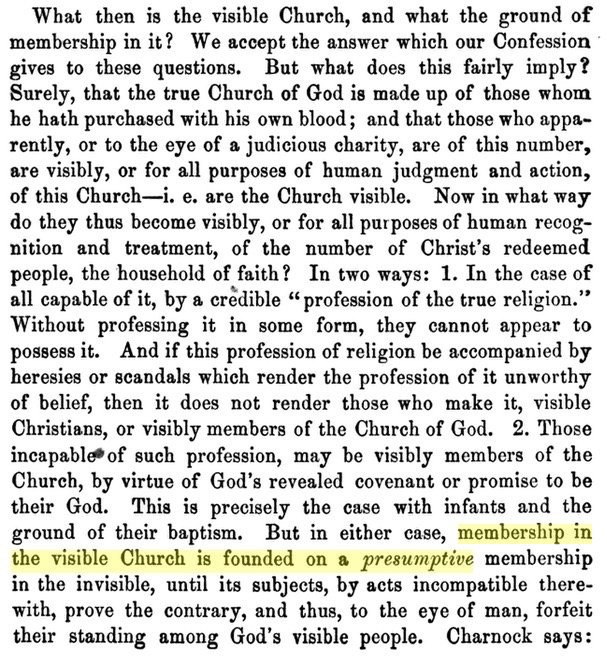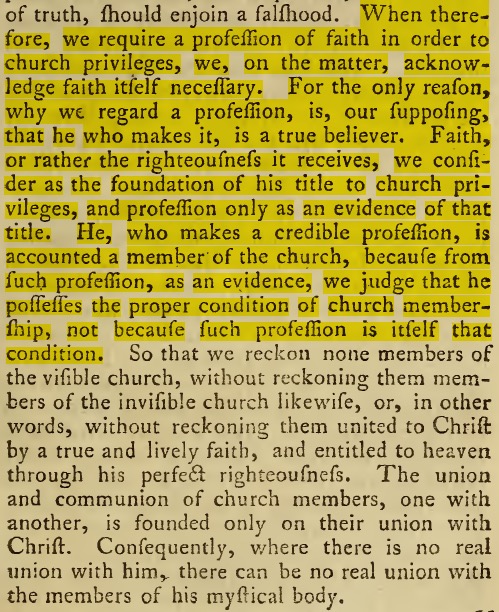Resources
Did A.W. Pink agree w/ 1689 Federalism?
On 03, Oct 2014 | In Resources | By Brandon Adams
Did A.W. Pink agree with 1689 Federalism?
Considering the contents of this covenant, we are fully in accord with John Owen that there is in it “a recapitulation and confirmation of all the promises of grace that have been given unto the Church from the beginning, even all that was spoken by the mouth of the holy prophets that had been since the world began (Luke 1:70).” The original promise (Gen 3:15) contained in germ form the whole essence and substance of the new covenant: all promises given unto the church afterward being but expositions and confirmations of it.
Arthur W. Pink (2010-03-19). The Divine Covenants (Kindle Locations 4625-4629). . Kindle Edition.
Republication, the Mosaic Covenant, and Eternal Life
On 27, Sep 2014 | In Resources | By Brandon Adams
Here are some resources that help clarify some issues related to 1689 Federalism.
First, it is important to understand that the WCF rejects the idea that the Mosaic Covenant operates upon a principle of works. However, the LBCF modified 19.2 to allow it.
Second, Samuel Renihan explains how 1689 Federalism is related to the doctrine of republication. He notes that 17th century particular baptists were not all in agreement.
While the majority of Particular Baptists agree that the Mosaic Covenant is a Covenant of Works, how it relates to the original Covenant of Works varies in their thought. Some state in the strongest terms that it IS the original Covenant of Works reapplied to Israel. That would make eternal life possible through the Mosaic Covenant itself, a point that Coxe and Owen would have disagreed with (and I disagree there too)… If you agree with Coxe, you are agreeing that the Mosaic Covenant is a Covenant of Works in subserviency to the Covenant of Grace. It looks back to Adam and forward to Christ. Given that Republication has become such a broad term, you would be subscribing to some of its notions, but in a specific way, not as a whole.
Richard Barcellos offers a brief comment:
See also Barcellos’ JOHN OWEN AND NEW COVENANT THEOLOGY: Owen on the Old and New Covenants and the Functions of the Decalogue in Redemptive History in Historical and Contemporary Perspective wherein he notes “Owen did not believe that Christ fulfilled the terms of the Old Covenant in itself for believers.”
It is important to note this variety of opinion because the resources on this website also express this variety. The videos and the Coxe/Owen volume believe that the Old Covenant was only concerned with temporal life in the promised land. On the other hand, Jeffery Johnson’s two books argue that the Old Covenant was a covenant of works offering eternal life and was thus fulfilled by Christ. Pascal Denault initially expressed the latter view in section 3.2 of his book, but he has since changed his position and is now in agreement with the Coxe/Owen view. See him answer this question at 36:00 in this Q&A video.
Here are two posts that discuss the merits of these two different views and engage in some helpful interaction.
- Clarification on the Mosaic Covenant and Eternal Life
- Eternal Life and the Mosaic Covenant
- 2015 Founders Conference w/ Commentary
The heart of this disagreement revolves around the distinction between law and covenant. For a helpful elaboration on this, see Samuel Renihan’s two posts:
- Form and Matter in Covenant Theology
- Form and Matter + Promise and Promulgation = Particular Baptist Federal Theology
as well as Richard Barcellos’
- SOME THOUGHTS ON “VOLUNTARY CONDESCENSION ON GOD’S PART” IN THE CONFESSION AND CONTEMPORARY THEOLOGY
- or, since the above is offline Nehemiah Coxe on Merit in LBCF 7.1
Finally, please also consult Bryan Estelle’s excellent essay Leviticus 18:5 and Deuteronomy 30:1-14 in Biblical Theological Development: Entitlement to Heaven Foreclosed and Proffered in the volume The Law is Not of Faith.
What Covenant did Christ Fulfill?
Those who believe the Mosaic Covenant was limited only to temporal life in Canaan would answer the question as follows:
The law of God (moral law) itself does not contain the works principle. It is the standard for all image bearers (servants), but there is no reward offered for obedience (Luke 17:7-10). Because it is the standard of all image bearers, it is included in every covenant that God makes with men. However, the role the law plays is determined by the particular covenant stipulations.
In the Adamic Covenant, God adds the promise of eternal rest for Adam’s obedience, turning the law into a covenant of works (Rom 4:4, LBCF 7.1, 19.6).
The Old Covenant also contained the moral law, as all covenants do. Its terms were similar to the Adamic Covenant, but different. It gave the law as a covenant of works (Rom 4:4, Lev 18:5) but the reward was temporal life and blessing in Canaan. In this sense, it served as a reminder of the Adamic Covenant of Works, but it was not itself the Adamic Covenant of Works.
The New Covenant is the outworking of the Covenant of Redemption in time, and thus it is Christ’s Covenant of Works. The moral law was part of this covenant as well. It was given to Christ as a covenant of works, along with the added stipulation of bearing the wrath of his people, with the promised reward being a heavenly inheritance and a people.
In that way we can clearly articulate what reward is in question and how typology relates.
We can also see that as Christians are still image bearers, we are still obligated to obey the moral law, but not as a covenant of works (LBCF 19.6). When Paul speaks of not being under the law but under grace he is referring to the law as a covenant of works, from which we are freed by the life and death of Christ for us. He reasons from the typology of the Mosaic Covenant back to the original Covenant of Works. Bryan Estelle does a good job of demonstrating this nuanced understanding of the old covenant (see here also). He argues that in the course of redemptive history, by the time we reach the New Testament “Israel’s disobedience has triggered the curse sanctions. Therefore, the new covenant context has essentially changed matters here… What was prototypical [life in Canaan] has been eclipsed by what is antitypical [eternal life].” Thus when Paul speaks of the law as a covenant of works, he is no longer referring to life in Canaan.
Podcast Interview: Jeffery Johnson’s “The Fatal Flaw”
On 27, Sep 2014 | In Audio, Jeffery Johnson, Resources | By Brandon Adams

On episode 19 of our podcast, we got Brandon Adams to interview Jeff Johnson about his book The Fatal Flaw of the Theology Behind Infant Baptism. This is part one of a two part interview (here is part 2.)
After that, we have Sam Renihan on our “Ask a Reformed Baptist” segment. We talk about some Reformed Baptist headlines and give you a preview of next week’s episode featuring part two of the interview.
 Podcast #19: Jeff Johnson – The Fatal Flaw of the Theology Behind Infant Baptism + More [ 1:21:57 | 37.57 MB ] Hide Player | Play in Popup | Download
Podcast #19: Jeff Johnson – The Fatal Flaw of the Theology Behind Infant Baptism + More [ 1:21:57 | 37.57 MB ] Hide Player | Play in Popup | Download

On episode 20 of our podcast, we got Brandon Adams to interview Jeff Johnson about his book The Fatal Flaw of the Theology Behind Infant Baptism. This is part two of a two part interview (here is part 1.)
After that, we have Dr. James Renihan on our “Ask a Reformed Baptist” segment. We talk about some Reformed Baptist headlines (with our SPECIAL GUEST!) and give you a preview of next week’s episode featuring Richard Barcellos telling us about Reformed Baptist Academic Press.
 020 – Jeff Johnson – The Fatal Flaw of the Theology Behind Infant Baptism (2 of 2) + More [ 1:20:24 | 36.86 MB ] Hide Player | Play in Popup | Download
020 – Jeff Johnson – The Fatal Flaw of the Theology Behind Infant Baptism (2 of 2) + More [ 1:20:24 | 36.86 MB ] Hide Player | Play in Popup | DownloadThe Functions of the Law of God in the Bible (Barcellos lecture)
On 16, Sep 2014 | In Resources, Richard Barcellos, Video | By Brandon Adams
A sample lecture from the Institute for Reformed Baptist Studies Continuing Education Program
Course Description: This study will cover some of the views of various Reformed theologians on the functions of the Law of God, concentrating on the Decalogue, as well as the confessional position. Once the historical-theological issues are covered, the lectures will then focus on a biblical-theological overview of the subject at hand. Special attention will be given to the functions of the Decalogue and its utility for believers in Christ.
Hermeneutical Concepts and Ways the Bible Interprets Itself Video Length: 1h 6m 6s
James Renihan on the Mosaic Covenant (lecture)
On 16, Sep 2014 | In James Renihan, Resources, Video | By Brandon Adams
A sample lecture from the IRBS Continuing Education Program
BAPTIST DISTINCTIVES 2 CREDIT HOURS. This course is designed to teach the distinct qualities and doctrines of Baptists, including the covenant theology of Reformed Baptists, the hermeneutics of continuity and discontinuity, the nature of law and covenant, as well as making a positive case for believer’s baptism, and defending against the arguments of Paedobaptists.
Covenant Theology: The Mosaic Covenant Video Length: 1h 11m 16s
Redeemer Radio: God’s Covenant
On 16, Sep 2014 | In Audio, Resources, Samuel Renihan | By Brandon Adams
Redeemer Reformed Baptist Church in Redlands, CA has a radio ministry. They have been working through the London Baptist Confession with various pastors from Southern California.
|
|
Samuel Renihan Sermons in Genesis on Covenant Theology
On 16, Sep 2014 | In Audio, Resources, Samuel Renihan | By Brandon Adams
|
|
|
|
|
|||||
|
|||||
|
|||||
|
|||||
|
|
||||||
|
|
Particular Baptists and the Substance/Administration Distinction
On 21, Aug 2014 | In Resources, Samuel Renihan | By Brandon Adams
- Particular Baptists and the Substance/Administration Distinction (Part 1)
- Particular Baptists and the Substance/Administration Distinction (Part 2)
by Sam Renihan
Kingdom through Covenant, A Review Article by Samuel Renihan
On 07, Apr 2014 | In Resources, Samuel Renihan | By Brandon Adams
Journal of the Institute of Reformed Baptist Studies, 2014

It finally arrived!
Product description
The Journal of the Institute of Reformed Baptist Studies (JIRBS) is published to explain and support the theology of Holy Scripture as it is summarized in the Second London Baptist Confession of Faith. The journal will be published annually.
226 pages
Published 2014
Articles
- COMMUNION AT THE LORD’S SUPPER: 1 Corinthians 10:16 in its Exegetical and Confessional Context by Richard C. Barcellos
- SEPARATING GOD’S TWO KINGDOMS: Two Kingdom Theology among New England Baptists in the Early Republic by Ronald Baines
- ‘THAT STRONG HOLD OF THEIR COMMON FAITH’: Salvation in Christ Alone among Seventeenth-Century Baptists by James M. Renihan
- OF THE NATURE OF GOD: The Inter-Relation of Essence and Trinity in Edward Leigh’s A Systeme or Body of Divinity (1662) by Stefan T. Lindblad
- STILL IMPASSIBLE: Confessing God without Passions by James E. Dolezal
- Kingdom through Covenant: A Biblical-Theological Understanding of the Covenants, A Review Article by Samuel Renihan
Christ and His Covenant
On 02, Apr 2014 | In Audio, Resources, Samuel Renihan | By Brandon Adams
|





